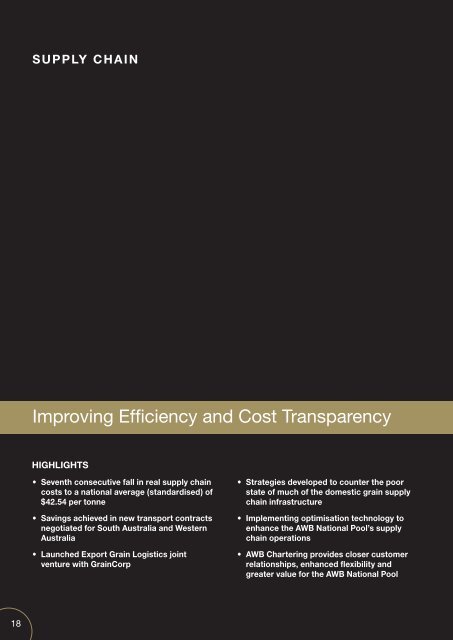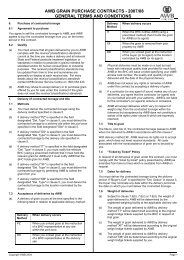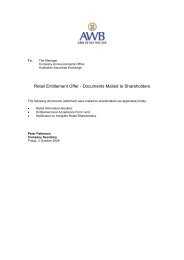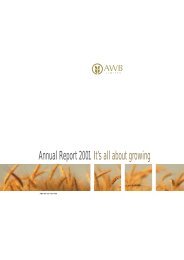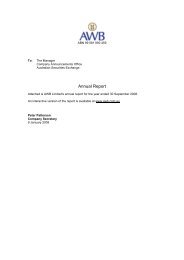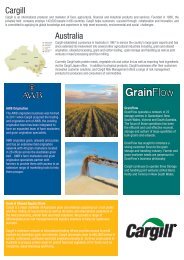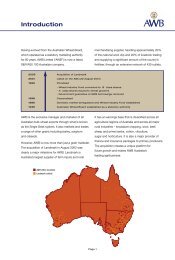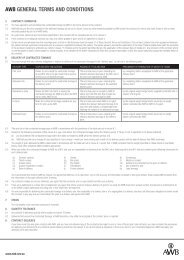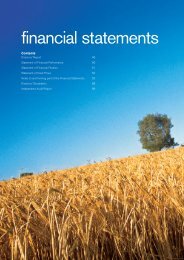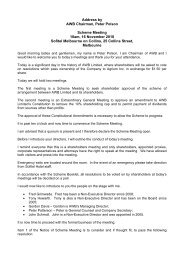supply chain - AWB Limited
supply chain - AWB Limited
supply chain - AWB Limited
- No tags were found...
You also want an ePaper? Increase the reach of your titles
YUMPU automatically turns print PDFs into web optimized ePapers that Google loves.
SUPPLY CHAINImproving Efficiency and Cost TransparencyHIGHLIGHTS• Seventh consecutive fall in rea l <strong>supply</strong> <strong>chain</strong>costs to a nationa l average (standardi sed) of$42.54 per tonne• Savings achieved in new transport contractsnegotiated for South Australia and WesternAustralia• Launched Export Grain Logistics jointventure with GrainCorp• Strategies developed to counter the poorstate of much of the domestic grain <strong>supply</strong><strong>chain</strong> infrastructure• Implementing optimisation technology toenhance the <strong>AWB</strong> National Poo l’s <strong>supply</strong><strong>chain</strong> operations• <strong>AWB</strong> Chartering provides closer customerrelationships, enhanced flexibility andgreater value for the <strong>AWB</strong> National Pool18
The record 19.1 million tonne <strong>AWB</strong> National Poolexport program severely tested the Australian grain<strong>supply</strong> <strong>chain</strong>.The large export program, coupled with an increase indemand from the mineral sector for rail assets, causeda marked reduction in the nation’s capacity to movegrain to port. To counter this, <strong>AWB</strong> implementedextensive asset utilisation planning and executionmanagement. This logistics program moved more than90% of the export task within nine months of harvest,setting grain movement and shipping records in theprocess.Sales exceeded the nominal capacity of the <strong>supply</strong><strong>chain</strong> for most of the year, but <strong>AWB</strong>’s logisticalmanagement ensured efficiency measures wereintroduced to maximise the tonnes shipped whileholding costs at appropriate levels for <strong>AWB</strong> NationalPool participants.In improving <strong>supply</strong> <strong>chain</strong> efficiency, <strong>AWB</strong> faces amajor challenge due to the poor state of much ofAustralia’s grain <strong>supply</strong> <strong>chain</strong> infrastructure. <strong>AWB</strong>is encouraging greater competition and investmentto counter the inefficiencies prevalent in thedomestic grain <strong>supply</strong> <strong>chain</strong>, and is also developinga <strong>supply</strong> <strong>chain</strong> optimisation strategy to best utiliseexisting assets.MANAGING SUPPLY CHAIN COSTSFor the 2003–04 <strong>AWB</strong> National Pool, real <strong>supply</strong> <strong>chain</strong>service provider charges (covering the transport, storageand handling, and port-related services that <strong>AWB</strong>negotiates on behalf of the Pool) were reduced for theseventh consecutive year.Growers paid an average (standardised) of $42.54 pertonne in site-to-sea <strong>supply</strong> <strong>chain</strong> costs, down from$43.32 the previous year. However, in terms of actualexpenditure, many growers would have experienced anincrease in costs due to continued nation-wide problemswith the congestion and degradation of the <strong>supply</strong> <strong>chain</strong>infrastructure.Critical to <strong>AWB</strong>’s achievements in cost reduction werenew contracts with transport service providers in thestates that enjoyed strong seasons – Western Australiaand South Australia. For example, <strong>AWB</strong> amended throughnegotiation the Western Australian rail contract in 2003–04, resulting in a better position for the <strong>AWB</strong> NationalPool. This renegotiation resulted in a 7.5% rail freightsaving for <strong>AWB</strong> National Pool participants and reducedthe Pool’s exposure to rail costs by $15 million a year.A new rail contract was also negotiated in South Australiawhich introduced a more cost-reflective site-based pricestructure for grain receival sites and in so doing reducingSouth Australian freight rates by 3%.A number of long-term road contracts were alsore-negotiated during 2003–04 with favourable outcomes,especially in the Albany region where rate reductions ofup to 10% were achieved at some sites.Despite these successes, some <strong>supply</strong> <strong>chain</strong> serviceproviders still do not have cost–reflective prices, that is,their charges do not differentiate between efficient assetsand those with high operating costs. This is true for bothup-country storages and ports, which distorts the pricingsignals to growers thereby increasing costs.Recognising the importance of having cost–reflectivecharging structures, <strong>AWB</strong> is continually striving to havebulk handling and rail companies reflect the actual costof providing a service at individual sites and ports.CREATING EFFICIENCIESTHROUGH PARTNERSHIPSThe 2003–04 Pool life saw further consolidation of theAustralian <strong>supply</strong> <strong>chain</strong> infrastructure. For example, CooperativeBulk Handling of Western Australia (CBH)merged with the Grain Pool of Western Australia andGrainCorp purchased the Queensland bulk handlerGrainCo. This has contributed to an environment whereservice providers have obtained even stronger bargainingpositions with grain producers and exporters.To meet this challenge and to drive improved assetutilisation, <strong>AWB</strong> has explored a number of joint ventureopportunities with <strong>supply</strong> <strong>chain</strong> service providers.After successful negotiations between <strong>AWB</strong> andGrainCorp, the two companies joined together to form‘Export Grain Logistics’, a joint venture designed toimprove coordination of the grain export task and toincrease efficiencies. The joint venture will manage theoperation of the export grain <strong>supply</strong> <strong>chain</strong> on behalf of<strong>AWB</strong> and GrainCorp in New South Wales, Queenslandand Victoria.It is expected that the joint venture will enable existinginfrastructure to be more efficient by improving railscheduling, whilst lowering vessel demurrage costs at19
port by reducing delays in cargo accumulation. The jointventure should also encourage investment in <strong>supply</strong><strong>chain</strong> infrastructure development by improving informationflows on price and storage.<strong>AWB</strong> has pursued similar arrangements with monopolyservice providers in Western Australia (CBH) and SouthAustralia (ABB Grain <strong>Limited</strong>).<strong>AWB</strong> is open to all opportunities to introduce greaterefficiencies in the storage sector. As a result, <strong>AWB</strong> hasbeen working with numerous private storage operators,including some grower co-operatives, to establishcredible alternative suppliers of storage services.OPTIMISING THE SUPPLY CHAINAfter steadfastly pursuing reduced <strong>supply</strong> <strong>chain</strong> costsfor the <strong>AWB</strong> National Pool over the past decade byintroducing an environment of greater transparency andcompetition that is conducive to investment, <strong>AWB</strong>recognises that further significant gains can now only befully realised through better optimisation of the system.Optimisation involves introducing pressure and rewardsfor wheat to be delivered to the most effi cient siteslocated in the best geographic positions for delivery tothe most appropriate ports.<strong>AWB</strong>’s approach has seen real <strong>supply</strong> <strong>chain</strong> costs fall forthe past seven years and has been instrumental inproviding incentives in excess of $200 million for capitalinvestment in rail, storage and port infrastructure (this isin addition to <strong>AWB</strong> <strong>Limited</strong>’s investments in <strong>AWB</strong>Grainflow). However, this approach now needs to beaugmented with an optimisation strategy.The case for <strong>supply</strong> <strong>chain</strong> optimisation is strengthenedby the poor state of much of Australia’s <strong>supply</strong> <strong>chain</strong>infrastructure. <strong>AWB</strong>’s pursuit of its mandate of maximisinggrower returns by minimising <strong>supply</strong> <strong>chain</strong> costs isincreasingly constrained by Australia’s antiquated grain<strong>supply</strong> <strong>chain</strong> infrastructure.Both recurrent and new investment in the system’sinfrastructure – rail, road, and up-country and portstorage and handling facilities – is inadequate. As a resultthe <strong>supply</strong> <strong>chain</strong> has reached a point where majorinvestment is required to ensure the Australian industryis able to fully realise its export potential. Unfortunately,this short-fall is occurring at a time when some ofAustralia’s competitors, in particular the former SovietUnion states, are upgrading their infrastructure.In particular, the rail network used to transport grain,which is now predominantly in private rather than StateGovernment hands, is deteriorating in many parts of thecountry, exacerbating the difficulties associated withmeeting export demand in a timely manner.<strong>AWB</strong> is attempting to counter these problems bydeveloping optimisation technology to enhance themanagement of the <strong>AWB</strong> National Pool’s <strong>supply</strong> <strong>chain</strong>operations. State-of-the-art software is being developedto model the wheat export <strong>supply</strong> <strong>chain</strong> from receival toAustralian port to end-use customer.This model will determine optimal planning for the <strong>AWB</strong>National Pool by simultaneously evaluating all key factorswithin the <strong>supply</strong> <strong>chain</strong>, including <strong>supply</strong>, overseasdemand, customer preference, storage and handlingcosts, transport costs and port costs.50<strong>AWB</strong> NATIONAL POOL STANDARDISED SUPPLY CHAIN COSTS45($ per tonne)4035301996-971997-981998-991999-002000-012001-022002-032003-0420These domestic <strong>supply</strong> <strong>chain</strong> costs represent a national average standardised to accountfor fluctuations in volume and location.
Additionally, optimisation can only be achieved if growerscan identify the most efficient sites for their grain. Tothis end, the <strong>AWB</strong> National Pool provides transparentprice signals to allow growers to make informed choicesin relation to delivery of grain via the site-to-sea costspublished on the <strong>AWB</strong> website (www.awb.com.au).All these efforts are part of <strong>AWB</strong>I’s ‘Shaping the Future’strategy designed to protect and grow the value the <strong>AWB</strong>National Pool can generate in the tough internationalmarket.COMPETITIVE CHARTERING<strong>AWB</strong> Chartering, a division of <strong>AWB</strong> <strong>Limited</strong>, acts as aservice provider to <strong>AWB</strong>I. It offers competitive freightservices to assist in the execution and improve the valueof <strong>AWB</strong> National Pool sales. <strong>AWB</strong> Chartering is bound bythe <strong>AWB</strong> constitution to operate in a manner thatmaximises <strong>AWB</strong> National Pool returns to Australianwheat growers.<strong>AWB</strong> Chartering can offer competitive freight rates tomany overseas customers who may not enjoy the sameaccess to capital, chartering expertise, economies ofscale and information that <strong>AWB</strong> provides to the Pool ininternational freight markets.The ability to provide this chartering service strengthensthe business relationships international customers havewith the <strong>AWB</strong> National Pool, which in turn improves theglobal competitiveness of Australian wheat. Importantly,using an internal <strong>AWB</strong> service provider to manage shipchartering protects commercially confi dential Poolinformation.By selling wheat inclusive of sea carriage ‘Cost andFreight’ (CFR) through <strong>AWB</strong> Chartering, the <strong>AWB</strong> NationalPool can exploit its Single Desk position to achieve agreater return for Australian wheat, while remainingcompetitive on the landed price for internationalcustomers.Selling CFR also gives the <strong>AWB</strong> National Pool fl exibilitywhen managing its own logistics and grain fl ows. Forexample, through <strong>AWB</strong> Chartering a vessel scheduled togo to one market can be switched at port, or even midvoyage,to take advantage of a new opportunity thatemerges elsewhere.<strong>AWB</strong> Chartering increases the competitiveness ofAustralian wheat by using combined cargoes of wheatand other commodities. In several markets, this haslowered landing costs, which has translated to moresavings for customers, in turn making the <strong>AWB</strong> NationalPool more internationally competitive.Importantly, the fact that <strong>AWB</strong> Chartering operatesseparately from <strong>AWB</strong>I can protect the <strong>AWB</strong> National Poolfrom some of the risks associated with the sea freightmarket.Ingrid TaylorGrower Services OfficerAnthony DiamanteChartering Manager21
GROWER SERVICESWorking with Growers to Improve ReturnsHIGHLIGHTS• Golden Rewards resulted in qualitypremiums to growers of on average $8.97per tonne for the benchmark grade, APW• The evolution of Golden Rewards –paying premiums for specific varieties• Improving our network of specialistGrain Marketers• Consultation with growers a priority –450 growers visited head office, four <strong>AWB</strong>National Pool forums held across the wheatbelt,inaugural Young Leaders’ Conference• Grower support for the Single Deskremains high• Improving service performance for growers– more than 99.5% of Pool payments togrowers made on time22
Matthew HolgateState Grain Manager, Victoria (left)As the manager of Australia’s Single Desk wheatmarketing system, <strong>AWB</strong> places great importance oncommunicating and consulting with growers to improvetheir <strong>AWB</strong> National Pool returns.During the life of the 2003–04 <strong>AWB</strong> National Pool,several hundred wheat growers from around Australiatoured <strong>AWB</strong>’s head office in Melbourne to see firsthandhow the marketing of the Australian wheat cropis carried out on their behalf.<strong>AWB</strong> has a strong on-the-ground presence in ruraland regional areas, with an extensive network ofspecialist grain marketers located across the wheatbelt.Some 375 grower meetings were held during the2003-04 Pool life where key production and marketinginformation was presented and discussed.GOLDEN REWARDSGolden Rewards, the most sophisticated paymentsystem for wheat producers anywhere in the world,continues to play a pivotal role in <strong>AWB</strong>’s interaction withgrowers by improving wheat quality and Pool returns.Golden Rewards is designed to provide accurate marketsignals to Australia’s grain growers through a paymentsystem that rewards growers for delivering the types ofwheat that international customers demand. Thisinnovative system eliminates ‘cliff-face’ pricing so thereare no severe penalties for growers if their wheat narrowlymisses the mark on one of the designated qualityattributes.When the <strong>AWB</strong> National Pool first introduced thispayment system in 2000, Golden Rewards incorporatedpayment scales for protein and screenings levels. In2002, it evolved to include payment scales for moisture,in recognition of the fact that dryness in wheat is anattribute valued by processors. Now, growers arerewarded every time they improve the value of the cropby increasing protein levels or reducing screenings andmoisture.The value of Golden Rewards for wheat growers isdemonstrated by the average payment for APW in the2003–04 <strong>AWB</strong> National Pool. While the APW pay-gradewas finalised at $233.06 per tonne, on average, growersdelivering to this grade received an additional $8.97 pertonne in Golden Rewards quality payments.By specific major pay-grade, the average GoldenRewards premiums were:APH – $12.97 per tonneAHAPWASW– $6.06 per tonne– $8.97 per tonne– $6.85 per tonneASWN – $7.04 per tonneAPDR– $13.04 per tonne<strong>AWB</strong> regularly reviews Golden Rewards to improvemarket signals to growers and thereby the overall qualityof the Australian crop.In mid-October 2004, <strong>AWB</strong> announced the next evolutionof the Golden Rewards system. From the 2005-06harvest, under a system known as ‘Premium ChoiceVarieties’, growers will be paid premiums over theEstimated Pool Return for particular varieties that improvethe overall quality of the Australian crop profile.GRAIN MARKETING NETWORK<strong>AWB</strong> understands a regional presence with specialistgrain marketing staff located throughout the Australianwheat-belt, is critical to its relationship with growers.A strong on-the-ground presence in rural and regionalAustralia allows <strong>AWB</strong> to listen to growers about theirneeds, as well as provide them with the most up-to-datemarket information and the latest product and serviceadvice relating to the <strong>AWB</strong> National Pool.During the life of the 2003-04 Pool, as part of theintegration of <strong>AWB</strong> <strong>Limited</strong> and the 400-plus Landmarkoffices, <strong>AWB</strong> strengthened its Grain Marketing division.There are now 50 Grain Marketers located in Landmarkbranches in grain growing areas across the country.Collectively, these <strong>AWB</strong> Grain Marketers conducted 375grower meetings during the life of the 2003-04 <strong>AWB</strong>National Pool, providing key information such as marketsignals, receival standards, <strong>AWB</strong> wheat marketingoptions and how the <strong>AWB</strong> National Pool works, alongwith local liaison for initiatives such as grower silocommittees.The major <strong>AWB</strong> National Pool grower meetings for theyear were the four <strong>AWB</strong> National Pool Forums held atEsperance and Morawa in Western Australia, Cummins inSouth Australia and Wagga Wagga in New South Wales.More than 700 growers attended the Pool Forums.23
At these forums, <strong>AWB</strong> senior management discussedand received feedback on <strong>AWB</strong>’s long-term strategicplan, the market outlook and crop shaping information.In addition, growers had the opportunity to listen to andinteract with Mr Jimmy Chang of Federal Flour Mills inMalaysia, getting first-hand feedback from a majorcustomer of Australian wheat.CONSULTATION WITH GROWERSAside from locally based Grain Marketers, <strong>AWB</strong> has anumber of other key initiatives to improve two-waycommunications with growers.During the life of the 2003-04 <strong>AWB</strong> National Pool, therewas an extensive grower visitation program to <strong>AWB</strong>’shead office in Melbourne, with 450 growers from acrossAustralia briefed on <strong>AWB</strong>I strategy and National PoolOperations.In recognition of the need to nurture future leadership inthe industry, <strong>AWB</strong> also held its inaugural Young Leaders’Conference in Melbourne in August 2004.Attended by around 90 young growers from acrossregional Australia, the Conference was organised todevelop the capabilities of the next generation of leadersfor the grains industry and Australian agriculture ingeneral. A program was designed to allow the younggrowers to develop their knowledge and skills and helpestablish relationship networks. The impressive quantityand quality of the applications received to attend theconference reflected the strong interest among youngrural Australians for such an event.<strong>AWB</strong>’s consultation program with the Grains Council ofAustralia (GCA) and its state affiliates on all facets of the<strong>AWB</strong> National Pool continued in 2003-04. With at leastthree GCA meetings held at <strong>AWB</strong>’s Melbourne officeeach year, and regular monthly telephone conferenceswith GCA state affiliate grower groups, this consultationis extensive.The <strong>AWB</strong> Managing Director’s Roundtable and theregionally based Grower Consultative Groups have againbeen a valuable resource to <strong>AWB</strong>. These forums playeda key role in providing direction for the company andfeedback on its operations. In particular, they played alarge role in developing the <strong>AWB</strong>I strategic plan ‘Shapingthe Future’.In February 2004, around 180 growers from theConsultative Groups and the Roundtable met in Canberrafor an <strong>AWB</strong> Single Desk Summit where the National Poolstrategic plan was discussed and refined.Grower support for <strong>AWB</strong>’s management of the SingleDesk wheat marketing system remained strongthroughout 2003–04, as did support for the Single DeskDISTRIBUTION PROFILE OF 2003-04 <strong>AWB</strong> NATIONAL POOL EQUITY1200Cash on hand (millions of dollars)10008006004002000-200-400Feb 2003Mar 2003Apr 2003May 2003Jun 2003Jul 2003Aug 2003Sep 2003Oct 2003Nov 2003Dec 2003Jan 2004Feb 2004Mar 20047 Apr 2004Apr 2004May 2004Jun 20042 Jul 2004Jul 2004Aug 2004Sep 20041 Oct 2004Oct 2004Nov 2004Dec 20045 Jan 2004Jan 2005Feb 2005Mar 200521 Apr 2005Apr 2005May 2005This shows how the cashflow of the 2003–04 <strong>AWB</strong> National Pool was distributed over the life of the Pool. There were five distributions to growers on 7 April 2004, 2 July 2004, 1 October 2004, 5 January 2005 and 21 April 2005. 24
itself. <strong>AWB</strong>’s annual grower survey, conducted by TQAResearch in 2004, found 86% of growers supported theSingle Desk system for bulk wheat exports.In a survey conducted by Rural Press, published in 2003,82% of growers said they supported the Single Desksystem. In another independent survey by the KondininGroup, published in 2004, 82% of growers said theysupported the principle of Single Desk marketing and78% supported the current arrangements for the exportof Australian wheat.IMPROVING SERVICE PERFORMANCEWith 2003-04 Pool equity of $4.9 billion, distributing theproceeds to growers is a complex task. <strong>AWB</strong> recognisesthat paying growers accurately and on-time for their <strong>AWB</strong>National Pool deliveries is one of the most importantactivities it undertakes as the manager of the SingleDesk.<strong>AWB</strong>’s National Grower Service Centre, which helpsgrowers with their queries and marketing requirements,handled more than 86,000 calls during 2003-04, peakingat 800 a day during harvest. Over 96% of calls receivedby the Grower Service Centre were resolved in the initialtelephone call.To safeguard individual growers in their dealings withthe <strong>AWB</strong> National Pool, <strong>AWB</strong> has continued its complaintshandling process where a Grower Advocate canintervene to seek rapid and mutually beneficial solutionsin the event of a formal complaint by a grower. Thisprocess complies with the Australian Standard forcomplaints handling (AS 4269) and offers the option forgrowers to request intervention by the Grower Advocateif they feel their rights have not been observed.Historically, <strong>AWB</strong>’s performance in this area did notalways meet growers’ expectations. Accordingly, inrecent years <strong>AWB</strong> has invested significant resources toimprove its payments operations.<strong>AWB</strong>’s performance for the 2003–04 <strong>AWB</strong> Nationa l Poolexceeded the target of 99.5% of payments being madewithin seven days of rates being determined.David ChatawayGrower Services OfficerVARIETAL PAYGRADESBINNING LINES13.1%26.4%2.5%29.6%0.7%8.1%3.0%0.9%0.4%11.3%1.0%0.6%2.3%0.1%APHAHAUHAPWAPWTASWAGPFEEDASF1ASWNGUWFUWAPDRAGDR9.1%0.5%9.3%5.5%1.8%24.3%0.7%27.3%6.6%0.9%0.4%9.7%1.0%0.6%1.6%0.2%0.5%APH2HD1HD2AUH2APW1APW2APWTASW1AGP1FEEDSFT1ANW1GUW1FED2ADR1ADR2ADR3Golden Rewards improves product control for customers, pricing accuracy and market signals for growers.Without it, many specialty grades would be lost and grower returns would be reduced.25


